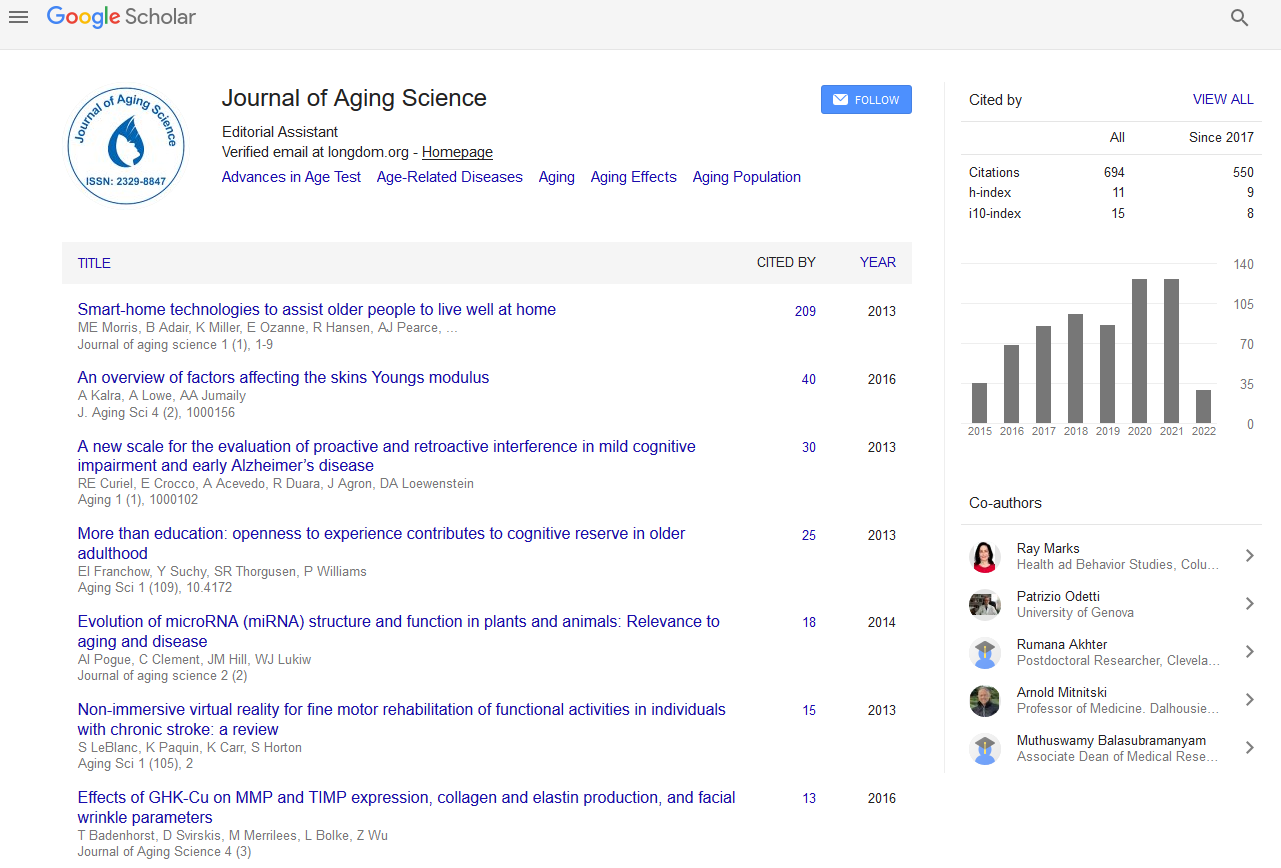PMC/PubMed Indexed Articles
Indexed In
- Open J Gate
- Academic Keys
- JournalTOCs
- ResearchBible
- RefSeek
- Hamdard University
- EBSCO A-Z
- OCLC- WorldCat
- Publons
- Geneva Foundation for Medical Education and Research
- Euro Pub
- Google Scholar
Useful Links
Share This Page
Journal Flyer

Open Access Journals
- Agri and Aquaculture
- Biochemistry
- Bioinformatics & Systems Biology
- Business & Management
- Chemistry
- Clinical Sciences
- Engineering
- Food & Nutrition
- General Science
- Genetics & Molecular Biology
- Immunology & Microbiology
- Medical Sciences
- Neuroscience & Psychology
- Nursing & Health Care
- Pharmaceutical Sciences
SARCOPENIC OBESITY DOES NOT INCREASE INFLAMMATORY PARAMETERS COMPARED TO OBESITY WITHOUT SARCOPENIA IN ELDERLY WOMEN
International Conference on Aging & Gerontology
August 8-9, 2016 Las Vegas, USA
Silvana Schwerz Funghetto, Alessandro de Oliveira Silva, Maurilio Tiradentes Dutra, Darlan Lopes de Farias, Marina Morato Stival, Luciano Ramos de Lima, Victor Barros Costa, Margo Gomes de Oliveira Karnikowski ,Vinícius Carolino Souza1 and Jonato Prestes
University of Brasilia (UnB), Brazil
University Center of Brasilia (UNICEUB), Brazil
Catholic University of Brasilia, Brazil
Posters & Accepted Abstracts: Aging Sci
Abstract:
This aging phenomenon results in a higher prevalence of chronic metabolic conditions such as cardiovascular disease, obesity, cancer and diabetes. Moreover, the decrease in muscle mass and strength accompanied by the increase in fat mass, contribute to the loss of functional capacity that is observed with aging.The aim of the present study was to compare blood inflammatory parameters in elderly women with and without Sarcopenic Obesity (SO). Two hundred-sixteen obese elderly women were included in this crosssectional study. They underwent body composition analysis by Dual-energy X-ray Absorptiometry (DXA) to define the presence of SO. Volunteers were divided into two groups: SO (n= 83; 66.7 ± 5.6 years) and non-SO (n= 133; 67.6 ± 4.9 years) for the comparison of inflammatory cytokines. Results revealed that 38.43% (n=83) of the participants were classified as sarcopenic obese, while 61.57% (n=133) were not. There were no statistically significant differences between SO and non-SO groups in the blood concentrations of the inflammatory parameters analyzed, e.g. interleukin-6 (0.82 ± 0.20 vs 0.83 ± 0.19 pg/ml; p=0.64), C reactive protein (2.70 ± 1.55 vs 2.82 ± 1.66 pg/ml; p=0.71), tumor necrosis factor alpha (0.71 ± 0.08 vs 0.70 ± 0.08 pg/ml; p=0.42) and interferon-gamma (0.75 ± 0.14 vs 0.74 ± 0.08 pg/ml; p=0.47), respectively. Thus, in the studied population, inflammatory parameters are not exacerbated by SO, probably due to the fact that both groups were obese.
Biography :
Silvana Schwerz Funghetto has completed his PhD at the University of Brasilia from 2014 and is a professor at the Postgraduate Course in Sciences and Technologies in Health at the University of Brasilia. She coordinates the Research Group Health, Care and Aging at the University of Brasilia. She has published more than five papers in reputed journals and Has Been serving the editorial board member of an repute.
Email: silvana.funghetto@gmail.com


